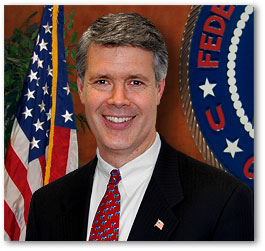
Robert M McDowell, former FCC Commissioner.
Former FCC Commissioner, Robert M. McDowell, served at that position between 2006 and late 2013; during his final year he gave a statement about the proposed deregulation of the Internet.
2012: THE YEAR FOR U.N. REGULATION OF THE INTERNET?
“The communications public policy effort that may affect all of us the most in 2012, however, will take place far from our shores. As we sit here today, scores of countries, including China, Russia and India, are pushing hard for international regulation of Internet governance. […] the effort to radically reverse the long-standing international consensus to keep governments from regulating core functions of the Internet’s ecosystem has been gaining momentum. The reach, scope and seriousness of this effort are nothing short of massive.
As Russian Prime Minister Vladimir Putin said last June, the goal of this effort is to establish “international control over the Internet using the monitoring and supervisory capabilities of the International Telecommunications Union.
Some countries in the developing world are intrigued by these ideas for a variety of reasons. Even though Internet-based technologies are improving billions of lives everywhere, some governments feel left out. They have formed impressive coalitions, and their efforts have progressed significantly. So merely saying “no” to any changes to the current structure of Internet governance is likely to be a losing proposition. Accordingly, we should encourage a dialogue among all interested parties and broaden the multi-stakeholder umbrella to find ways to address all reasonable concerns. As part of this conversation, we should underscore the tremendous benefits that the Internet has yielded for the developing world through the multi-stakeholder model.
Upending the fundamentals of the multi-stakeholder model is likely to Balkanize the Internet at best, and suffocate it at worst.
A top-down, centralized, international regulatory overlay is antithetical to the architecture of the ’Net, which is a global network of networks without borders. No government, let alone an intergovernmental body, can make decisions in lightning-fast Internet time. Economic and political progress everywhere, but especially in the developing world, would grind to a halt as engineering and business decisions inevitably would become politicized within a global regulatory body.
Instead, the international dialogue leading up to next December’s pivotal meeting should help expand the multi-stakeholder process, include a constructive role for the ITU and directly address concerns expressed by developing countries. At the same time, new rules, issued in seemingly innocuous increments through the ITU, or worse, through a new intergovernmental body, should be resisted. Modernization and reform can be constructive, but not if the end result is a departure from the multi-stakeholder model that would create a new overarching layer of international regulation. Thus far, those who are pushing for new intergovernmental powers over the Internet are far more energized and organized than those who favor the Internet freedom and prosperity that comes from the multi-stakeholder approach. It is time to awake from our slumber and engage before it is too late. I will be working hard on this matter throughout 2012. I urge you to learn more about it yourselves. These developments have the potential to affect the daily lives of all of us.”
The former FCC Commissioner urged for caution and a well-planned transition, unlike the current rushed plan that even former ICANN president and CEO, Rod Beckstrom, disagrees with.
Copyright © 2025 DomainGang.com · All Rights Reserved.












